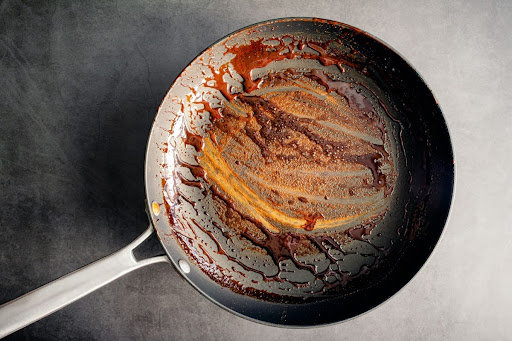How Do I Dispose Of Grease And Prevent Clogged Drains?

You just finished cooking up a perfect Sunday breakfast. The bacon is crisp, the eggs are done, and now a pan full of hot, sizzling grease sits on your stove. What’s your next move? For so many of us, the instinct is to pour that liquid right down the kitchen sink. You run the hot water, and the problem vanishes. It just makes sense, right? Your drain seems like it can handle anything. After all, how bad can a little cooking oil be?
It can be really, really bad.
That seemingly harmless liquid grease is a secret menace to your home’s plumbing. The moment it leaves your warm pan and hits the cold pipes, it starts a transformation. It cools, hardens, and clings to the inside of your pipes, creating stubborn blockages that can bring your entire home to a grinding halt. If you want to avoid this plumbing nightmare, you have to dispose of your cooking grease the right way. That means keeping it far, far away from your drains.
Liquid Cooking Oil Is Your Plumbing’s Worst Enemy
Think about what happens to bacon grease when it sits on the countertop. It turns into a solid, white lard. The same exact thing happens inside your plumbing pipes. When you pour hot oil or grease down the drain, it travels a short distance before the surrounding water and cold pipes cool it down. It then solidifies and sticks to the pipe walls.
This new layer of hardened grease acts like flypaper. It catches all the other debris you send down the drain, like food scraps, coffee grounds, and hair. Over time, these materials combine to form a dense, thick clog that water simply cannot push through. A simple chemical cleaning agent won’t dissolve this solid mass, leaving you with a serious plumbing problem.
Your Kitchen Sink Isn’t A Trash Can, And Treating It Like One Leads to Seriously Stubborn Clogs
As grease builds up, the diameter of your drain pipe slowly shrinks. You might first notice that your kitchen sink is draining a little slower than usual. You may hear some odd gurgling sounds as water struggles to get past the blockage. Before you know it, you have a complete backup.
A severe clog can cause dirty water to back up into your sink, your dishwasher, or even onto your kitchen floor. It becomes a sanitation issue that requires an experienced plumber to resolve. A simple plunger won’t break up a hard grease blockage that has been building for months or years.
The Problem Can Impact the Entire Neighborhood’s Sewer Lines!
Your home’s pipes are just the beginning. The grease you pour down your drain eventually makes its way into the municipal sewer system. When your grease combines with the grease from all your neighbors’ homes, it can create massive blockages in the main sewer lines.
These enormous clogs, sometimes called “fatbergs,” are a huge problem for many communities. They can cause widespread sewer backups, create environmental hazards, and are incredibly costly for your city to remove. The simple act of pouring grease down the drain in your kitchen contributes to a much larger community issue.
The Right Way to Get Rid of Cooking Grease Without Causing a Plumbing Catastrophe
Disposing of grease properly is easy, and it starts with a simple change in your cooking routine. Never pour grease, fats, or cooking oil down any drain. Not the sink, not the toilet, not the shower. Instead, follow these simple steps:
- Let It Cool. First, let the grease cool down in the pan. Never try to handle a pan full of boiling oil.
- Pour It in a Container. Once it’s at a safe temperature, pour the grease into a sealable, non-recyclable container. An old coffee can, a glass jar with a lid, or an empty milk carton works perfectly for this. Keep this container in a safe spot, perhaps under your kitchen cabinet.
- Toss It. When the container is full, just seal it up and throw it in your regular household trash.
Before you wash the pan, use a paper towel to wipe out any remaining grease residue. This small step prevents even tiny amounts of grease from building up in your pipes over time.
A Dedicated Grease Disposal System Keeps Your Countertops And Cabinets Clean
Making this a habit is the key to success. Keep your designated grease container in an accessible spot so you remember to use it every time you finish cooking. Having a plan before you even turn on the stove can make the process quick and clean.
If you happen to spill some oil on your countertop, resist the urge to wipe it directly into the sink. Instead, soak up the spill with a paper towel first. Then, use a good cleaning agent to remove any oily film left behind to prevent a sticky surface or a permanent stain. The goal is to stop grease from entering your drain in the first place.
Clogged Drains Are No Match For Zenner & Ritter
If you have sent grease down your drain one too many times and are now dealing with the consequences, we are here to help. Our team provides the professional plumbing services you need across the Buffalo and Niagara region to clear away those tough grease clogs for good. We will get your water flowing freely again and help you prevent future problems. Call today!
